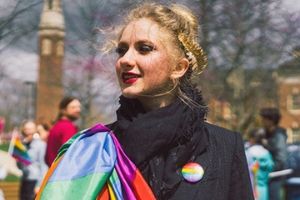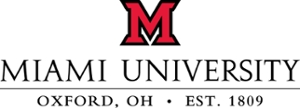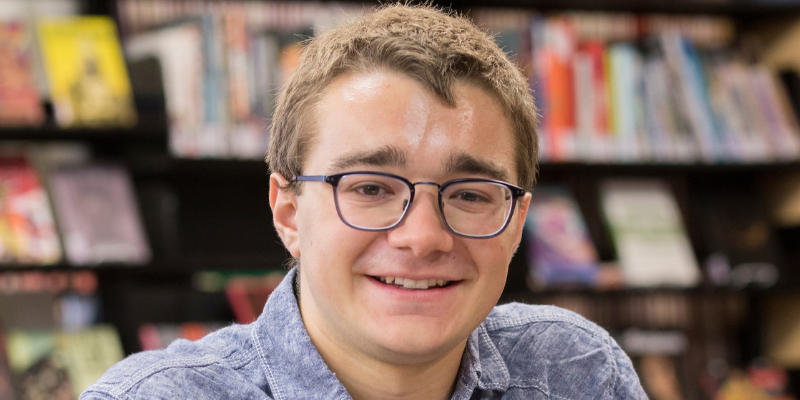Major Insight Ep 5: LGBTQ+ Activism Through Art and Literature


A production of Miami University and the Reframe podcast, Major Insight showcases the stories behind successful college students, their promising new research, and its relevance in our world.
As a student activist for LGBTQ rights, Hannah Clarke believes in being vocal, visible, and adamant about inclusion and acceptance. Hannah’s work also blurs the lines between academics and her social interests to show how both scholarship and activism can be deeply connected. And her debut novel, titled The Scapegracers, will be published by Erewhon Books next year.
Featured Majors
Classical Humanities; Creative Writing; Women, Gender & Sexuality Studies
Featured Organizations
Spectrum (LGBTQ student organization), The 2018-19 Altman Program, The Humanities Center
Featured Study Abroad
Literary London
Announcer:
Major Insight is a production of Miami University and the Reframe podcast. This is where we showcase successful students, their promising new research, and its relevance in our world.
(MUSIC)
Hannah Clarke believes in leading by example, and her time at Miami has been acutely focused on student activism. She’s been called an ally, advocate, champion, and educator for the LGBTQ community across campus, where she believes in being vocal, visible, and adamant about acceptance and inclusion.
Hannah is also a classical humanities, creative writing, and women, gender & sexuality studies triple major, and her work blurs the lines between academics and her social interests to show how both scholarship and activism can be deeply connected.
Her debut novel, titled The Scapegracers, the first in a new trilogy of young adult novels, is set to be published next year. And today, she talks with Major Insight host Jacob Bruggeman about using fiction as tool to achieve social change, the lack of media representation for queer youth, and much more.
Jacob Bruggeman:
All right, welcome to the podcast. So, Hannah, we typically start by just asking, you know, an overview of your achievement at Miami, study abroad, different research efforts, and so on. So could you give us a little bit of an overview of your past three semesters … excuse me. Six semesters here. Six or seven, right?
Hannah Clarke:
Time is an illusion, and I have absolutely no idea how that works. But I have been here, theoretically, for a span of time, in which I have had … this is now my second term as the president of Spectrum
Jacob Bruggeman:
And what is Spectrum, for our listeners?
Hannah Clarke:
Spectrum is the LGBTQ+ etc., etc., advocacy education awareness and social organization on this campus. That has existed under various shapes and names since about the 80s. And I’m very proud of that community. I did Literary London, which is a six-week program where in you do Shakespeare and other fun British-ism things, obviously in London, as the name would suggest. I did an undergraduate summer scholarship, and during that time I was also a Humanities Center Research Fellow. And that project was on the impact of classical humanities on queer youth, and identity formation of queer youth. And now I’m a Geoffrion Fellow with the Altman Program at Miami
Jacob Bruggeman:
On Truth and Lies.
Hannah Clarke:
On Truth and Lies.
Jacob Bruggeman:
So could you describe the project you're working on, which sounds quite incredible. So, jump into it.
Hannah Clarke:
So, I’m intending to do a performance art piece at the conference without much introduction or explanation, before or afterwards, on both the way gender, as a strict binary stacked device, is a central part of how fascism works, and what queer resistance looks like under fascism. And as we quickly hurtle towards an increasingly authoritarian state, I think that this kind of examination, particularly from a queer lens, is vital. And I would be very excited to bring that kind of lens, in a queer sort of medium to some place like a conference, right, that has fairly formalized expectations of what sorts of things are performed in that space. I think it'll be pretty rad.
Jacob Bruggeman:
Yeah, absolutely. It would be, in some sense, shattering and then negotiating a new expectation for what the Altman Symposium will allow for. You mentioned the line “how fascism works,” which is a book published by Jason Stanley, who visited here as part of the Truth and Lies program. So could you talk a little bit about how the build-up to this performance, creative efforts and research, I’m sure, has tied into the speakers that have come for this year’s Altman Program?
Hannah Clarke:
I mean, Stanley in particular, in the book How Fascism Works has a chapter specifically about gender, and the fact that patriarchy is a really essential component of fascism, and the ideologies that comprise and propel fascism forward. And in that, their lies the perspective that Stanley didn't quite touch on, which is what that means specifically for queer people and people who cannot fit within that paradigm. Not just who don't want to, but who, by virtue of their very being, are othered in that system in a potentially incredibly violent way.
A lot of the speakers have concluded their remarks, in their talk, by describing their idea of a utopian future, right. Trevor Paglen mentioned a world where art can just be art, and the need for capital and surveillance and state, particularly marshall state power, isn't in question. And we can just create for sake of beauty and discovery and knowledge. And I think that that mode of looking forward, in a fantastic and revolutionary and beautiful and fantastical and absurdist way, can be really vital in keeping your head when everything around you is crumbling, right. And I want -- even though I think the beginning half of my performance is going to be fairly dark -- for there to be a sense of euphoria near the end. A sense that queer realities and utopias and futures where we can be all that we are in community with all of everyone else. Which is exciting.
Jacob Bruggeman:
Yeah. There's the paraphrase from Ursula K. Le Guin - the late Ursula K. Le Guin - who unfortunately passed away, I think, late in 2018. And she said that, you know, in every utopia, there's a dystopian. In every dystopia, there's a utopia. And so, I’m curious in terms of how we make these things actionable? Whether, you know, like, at a more just world for the LGBTQ, etc., etc., as you said, community on campus, or the world writ large. What are the sort of actionable steps do, you think, the ways that utopia can be practiced? It's a big question. You'd be rich and famous if you knew the answer, but …
Hannah Clarke:
I mean, I think part of it is the creative step that is really hard to achieve in a particularly capitalist system, where we're encouraged to only do things that are productive. Only do things that have a capital outcome. And sometimes daydreaming doesn't. Often daydreaming doesn't. But I think allowing yourself, and community with your peers, with your found family, to really not just fantasize. But to imagine other ways of being in community with each other, in community with yourself, in community with your larger world, I think it's important.
I mean, it's why I think fiction is such a revolutionary tool. Because we need the sovereignty of our … the almost spiritual feeling of reading a book, right. The exhilaration of being able to imagine some way other than this is, I think, the first step to working towards that, right. And I think it isn't a step that's talked about enough. Because, yes, really actionable plans are tricky. But they're even trickier when you were completely stripped and exhausted, and have absolutely no feeling of hope spurring behind you. Or idea what something better could really feasibly look like. Which isn't a solution, but …
Jacob Bruggeman:
Yeah. And … but you're … I think you're getting at something important, which is that often today the creative is not seen as productive. But, in reality, like, the imagination is producing something, first and foremost. So it is productive, in a very strictly, you know, just definitional sense. But it's also essential in terms of, you know, if you think of like Maslow's hierarchy of needs, right. Like, you know, you have the shelter and food and water at the bottom. But at the top is self-actualization. And if that is our goal, you know, the radical imagination and generation of new ideas, definitely is productive, if only for the self, right. But we, as you're saying, live in a time in a society where people aren't necessarily encouraged to create as much as they are to clock in from 9:00 to 5:00. I’ll be curious to see what your what your performance is.
Another question I have for you is, on the question of fiction, how you've come to a new project that I just found out about, that you have a book trilogy. One is in the works. It's going to be published and you have two more on down the road. So, if you could, explain how that came about? What the inspiration was? Maybe give us a teaser of what the plot would be in this first book?
Hannah Clarke:
So, I write compulsively. It's, I think, a pretty well-known refrain now, from people who write compulsively, that it is like breathing, and not doing it is not optional. I got my agent’s contract two years ago. Actually, in Literary London. And I’ve been working on manuscripts, before and after that, kind of endlessly, right. The manuscript in particular, that just got the book deal, and the two subsequent deals that are compounded within that, is about queer youth and the ambiguities of queer youth. And, for me, the most obvious and logical connection to particularly a sapphic queer youth is the feeling of ambiguity that is more than just queerness the way it's normally contextualized, right. Which, for me, is magic. And the idea of the witch as someone who creates in and of themselves, and from their community and their ancestral knowledge, rather than by very colonial patriarchal religious means, right.
Science is - as much as I’m pro science - historically has been so compounded with a very white imperial sense of power. And the witch is someone who operates outside of that in a way that is very threatening. And I think, in queer becomings, the kind of ambiguity around witchcraft and devilishness feels very homey to me. And I didn't grow up with a lot of queer representation in fiction because who did? And I thought that having a group of young queer teenagers, who have magical abilities, who manifests outside of themselves the ambiguities that they feel within, would be important, and also a lot of fun.
Jacob Bruggeman:
So, could you tell us a little bit of the logistics? Who's the publisher? When's it coming out?
Hannah Clarke:
Yeah. So, the publisher is going to be Erewhon books. It's being run by Liz Karinski. They were a publisher with Tor for a long time. They have been editing for, I think, just under 15 years. They won a Hugo two or three years back, I believe. And this is their brand new imprint, and I’m very excited to see, obviously, not just my own, but the other kind of works that are going to coming out of this imprint. The first book of my trilogy is set to come out next year, and I imagine that the other two will be coming out in the subsequent years. One after another.
Jacob Bruggeman:
So, yeah, I'd be curious to know how your time at Miami, how your mentors here have been essential, or in some way involved, in sort of that self-actualization that is this book?
Hannah Clarke:
Yeah. I mean, I was really apprehensive coming to Miami. Because I was a townie first. And I think, really, the relationships I’ve had with other student activists, and with faculty, have been what make me feel -- empowered is the wrong word -- but propelled to a place where I can write. Write in a way that is legible to other people.
At the same time, whenever I have bizarre ideas for a research project, I’ve always had faculty members who have been really enthusiastically willing to support me, and create independent studies for me. I have had so many independent studies at my time in Miami, which is really remarkable, particularly as a humanities student. And I’m not sure if there are too many other universities, who are undergraduate humanities students, would have so many opportunities to pursue their bizarre ideas. And it's been really fruitful for me. And I think I’ve learned a lot of things that I might not have been able to access, or research, so specifically outside of that context. And my research … academia and creation are so closely entwined. And we like to pretend that they're completely disparate, and that's nonsense.
Researching the history and legacy of queer people in America, and researching the demonization of minoritized people, and researching the impact of things like mythology on a thousand queer youth -- I had a thousand and a half responses from people under the age of 25. All of it meant that the things that I was writing, I think, needed to be read by people who weren't just me. So even though I never workshopped any of my manuscript in any class, I didn't have direct faculty help, or really pure help with that, the whole community that I’ve found here was unquestionably nurturing to the process. And I’m really grateful for that.
Jacob Bruggeman:
So, our time here is coming to an end, as our time at Miami is more generally. So you have the book trilogy lined up. But what else is on the horizon?
Hannah Clarke:
Well, I’m still waiting to hear back from grad school. We shall see. In the event that one of the graduate programs I’ve applied to admits me, I will be studying queer monstrosity in literature, and the way that bodily ambiguity is used as coding for other, and the way that that is reclaimed more specifically. Which probably makes sense in context of the work I’ve done here.
In the events that I do not get into a graduate program I applied to, I’ll be writing full-time. And I have another manuscript lined up to pitch directly after the trilogy. And I imagine that even in a graduate setting and beyond, and into the wilds of academia, I will always be writing fiction, and making comics, and doing the forms that I think have not only, like, the radical joy of reading and experiencing. But also the ability to be accessible in ways that the academy isn't, right. You can put a lot of the same theoretical concepts into YA that you can put into a standard scholarly essay.
Jacob Bruggeman:
YA meaning young adult.
Hannah Clarke:
YA meaning young adult. Without pay walls, or a linguistic structure intelligible only by someone who has had seven coffees and locked themselves in the basement of King Library. I just I think that YA is really, really rad. And an awesome thing to offset really heavy theoretical research. So, ideally both will be in the horizon
Jacob Bruggeman:
Yeah, well, that's excellent. It could be both rad. And then also the space for the generation of radical ideas. That sounds like a good place to end. Thank you for coming on Hannah.
Hannah Clarke:
My pleasure.
(Music Up)
Announcer:
After graduating with degrees in Classical Humanities, Creative Writing, and Women, Gender & Sexuality Studies, Hannah Clarke will, in fact, be attending graduate school at the University of Chicago. And the first book of her new trilogy, titled The Scapegracers, will be out next year.
Major Insight a production of Miami University and the Reframe podcast. If you enjoyed this episode, please share it with a friend. There are more episodes available for free on Apple Podcasts and on Google Play Music.
SHOW NOTES:
A production of Miami University and the Reframe podcast, Major Insight showcases the stories behind successful college students, their promising new research, and its relevance in our world.
As a student activist for LGBTQ rights, Hannah Clarke believes in being vocal, visible, and adamant about inclusion and acceptance. Hannah’s work also blurs the lines between academics and her social interests to show how both scholarship and activism can be deeply connected. And her debut novel, titled The Scapegracers, will be published by Erewhon Books next year.
Featured Majors:
Classical Humanities; Creative Writing; Women, Gender & Sexuality Studies
Featured Study Abroad:
Literary London
Featured Organizations:
Spectrum (LGBTQ student organization), The 2018-19 Altman Program, The Humanities Center







